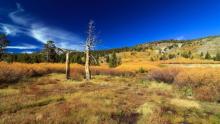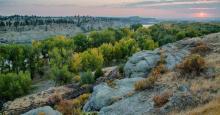Accreditation Awarded by the Land Trust Accreditation Commission
March 5, 2015 at 1:00 PM
Reno, Nevada – The Nevada Land Trust (NLT) has achieved land trust accreditation from the Land Trust Accreditation Commission, an independent program of the Land Trust Alliance.
“Nevada is a big state, and as the only independent land trust in Nevada, we know we have to be at the top of our game to successfully serve conservation needs statewide,” said Sonya Giroux, Operations and Finance Coordinator for Nevada Land Trust and manager of NLT’s accreditation effort. “Because of this, accreditation was a goal for us as soon as we learned about the program, and we are thrilled to be able to demonstrate our commitment to excellence to our community and the nation!”
Nevada Land Trust was formed in 1998 and has completed land protection projects safe-guarding more than 42,000 acres state-wide of the most pristine and important landscapes for wildlife, public recreation, agriculture, and watershed protection. NLT’s most recent work includes an addition of 31 acres to the David E. Moore Wildlife Sanctuary outside of Great Basin National Park in White Pine County, the protection of the final 1.76 acres of the popular snow play area in Tahoe Meadows, and the improvement of wildlife habitat on over 1,000 acres of City and County parks and private lands in Washoe County. Current projects include efforts to protect critical Bi-State Sage Grouse habitat in Douglas County and key access points to recreational areas along the Sierra Front.
Nevada Land Trust was awarded accreditation this February and is one of only 301 land trusts from across the country that has been awarded accreditation since the fall of 2008. Accredited land trusts are authorized to display a seal indicating to the public that they meet national standards for excellence, uphold the public trust and ensure that conservation efforts are permanent. The seal is a mark of distinction in land conservation.
“This round of accreditation decisions represents another significant milestone for the accreditation program; the 301 accredited land trusts account for more than three quarters of the 20,645,165 acres currently owned in fee or protected by a conservation easement held by a land trust,” said Commission Executive Director Tammara Van Ryn. “Accreditation provides the public with an assurance that, at the time of accreditation, land trusts meet high standards for quality and that the results of their conservation work are permanent.”
Each accredited land trust submitted extensive documentation and underwent a rigorous review. “Through accreditation land trusts conduct important planning and make their operations more efficient and strategic,” said Van Ryn. “Accredited organizations have engaged and trained citizen conservation leaders and improved systems for ensuring that their conservation work is permanent.”
According to the Land Trust Alliance, conserving land helps ensure clean air and drinking water; safe, healthy food; scenic landscapes and views; recreational places; and habitat for the diversity of life on earth. In addition to health and food benefits, conserving land increases property values near greenbelts, saves tax dollars by encouraging more efficient development, and reduces the need for expensive water filtration facilities. Across the country, local citizens and communities have come together to form more than 1,700 land trusts to save the places they love. Community leaders in land trusts throughout the country have worked with willing landowners to save over 47 million acres of farms, forests, parks and places people care about, including land transferred to public agencies and protected via other means. Strong, well-managed land trusts provide local communities with effective champions and caretakers of their critical land resources, and safeguard the land through the generations.
“Throughout the accreditation process, we saw our land trust blossom,” said Karen Ross, Board Chair from 2012-2014. “Staff and the board worked hand in hand to ensure that we were auditing and improving our processes and governance to create a much stronger, more sustainable organization. We feel that this is imperative to the future of our conservation efforts.”
~ ~ ~
About the Land Trust Accreditation Commission
The Land TrustAccreditation Commission, based in Saratoga Springs, N.Y., awards the accreditation seal to community institutions that meet national quality standards for protecting important natural places and working lands forever. The Commission is governed by a volunteer board of diverse land conservation and nonprofit management experts from around the country. See a complete list of all recently accredited land trusts online at http://www.landtrustaccreditation.org/land-trust-locator. More information on the accreditation program is available on the Commission’s website, www.landtrustaccreditation.org.
About The Land Trust Alliance
Founded in 1982, the Land Trust Alliance is a national land conservation organization that works to save the place people need and love by strengthening land conservation across America. The Alliance represents 1,200 member land trusts supported by more than 5 million members nationwide. The Alliance is based in Washington, D.C., and operated several regional offices. More information about the Alliance is available at www.landtrustalliance.org.


